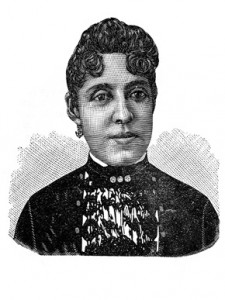
The Greatest Victories
In the trials to be suffered
In the fellowship with care
‘Tis the hidden inward struggle
That will prove the worst to bear.
‘Tis the strife that no man pities
‘Tis the cry that no man hears
‘Tis the victory unpaeaned
But by secret sobs and tears.
Ah! my friends. When God’s great angel
Cries aloud the deeds of night;
At the day when hearts are opened,
In the Holy Father’s sight.
Then the greatest deeds and noblest
Will be those unheard of now: —
Hidden under silent heart beats,
And an uncomplaining brow.
Deeds of patient self-rejection,
Wrung from hearts that madden’d moan:
Tender hearts that, like the Master,
“Trod the wine-press all alone.”
Hearts that purer grew, and fairer,
In the struggle day by day;
Learning thus from holy teachers
How to suffer and to pray.
(From The Musical Messenger. Vol. 1, No. 11. May, 1889. pp 1.)
“Our Light Affliction”
“Lord, dost thou call this, our affliction, Light?
Is all this anguish little in thy sight?”
“Child, bring thy balance out; put in one scale
All thine affliction, give them in full tale;
All thy bereavements, grievances and fears.
Then add the utmost limit of man’s years;
Now put my cross into the other side —
That which I suffered when I lived and died.”
“I cannot Lord. It is beyond my might;
And lo, my sorrows are gone out of sight.”
“Then try another way. Put in one scale
The glory now unseen behind the veil —
The glory given to thine own estate;
Use that exceeding and external weight;
Which kicks the beam?”
“Ah Lord, thy word is right;
Thus weighted, my sorrow doth indeed seem light.”
(From The Musical Messenger. Vol. 2, No. 1. July, 1889. pp 1.)
Amelia L. Tilghman was the founder and editor of the first African American music journal, The Musical Messenger. Established in Montgomery, Alabama in 1886, The Musical Messenger is widely known for setting the standard for reportage on black concert music in the African American press. Although publication of The Musical Messenger was short lived (ending sometime in 1891), the journal had a relatively wide circulation. Tilghman’s take on the arts was comprehensive: she published new ideas about music instruction and theory, the activities of notable black musicians and composers, and new African American musical compositions.
Born and educated in Washington, DC, Amelia L. Tilghman was a gifted singer, pianist, director and producer. She performed alongside several notable African American musicians of the period, including Marie Selika. In addition to her career as an educator, journalist, musician, and performer, Tilghman wrote poetry for The Musical Messenger and other African American women’s magazines. The two poems published here reflect Tilghman’s response to the political tensions and racial violence that rocked the Southern United States during the post-Reconstruction era and the way she harnessed African American music, art and literature in service of social justice.
Works Cited
Karpf, Juanita. “‘As with Words of Fire’: Art Music and Nineteenth-Century African-American Feminist Discourse.” Signs 24.3 (1999): 603-32. Web.
—. “The Early Years of African American Music Periodicals, 1886-1922: History, Ideology, Context.” International Review of the Aesthetics and Sociology of Music 28.2 (1997): 143-68. Web.
—. “An Opportunity to Rise: Reinterpreting Esther, the Beautiful Queen.” Black Music Research Journal 30.2 (2010): 241-71. Web.
Penn, Irvine Garland. “Amelia Tilghman.” The Afro-American Press and Its Editors. Springfield, Mass.: Willey, 1891, 401-5.
Scruggs, Lawson A. Women of Distinction: Remarkable in Works and Invincible in Character. Raleigh, N.C.: n.p., 1893, 211-16.
Wells, Jonathan Daniels. Women Writers and Journalists in the Nineteenth-Century South. New York: Cambridge UP, 2011. 181.
Wright, Josephine. “A Preliminary Bibliographical Guide to Periodical Literature for Black Music Research”. Black Music Research Journal 10.1 (1990): 14–17. Web.
Comments by Kristin Moriah